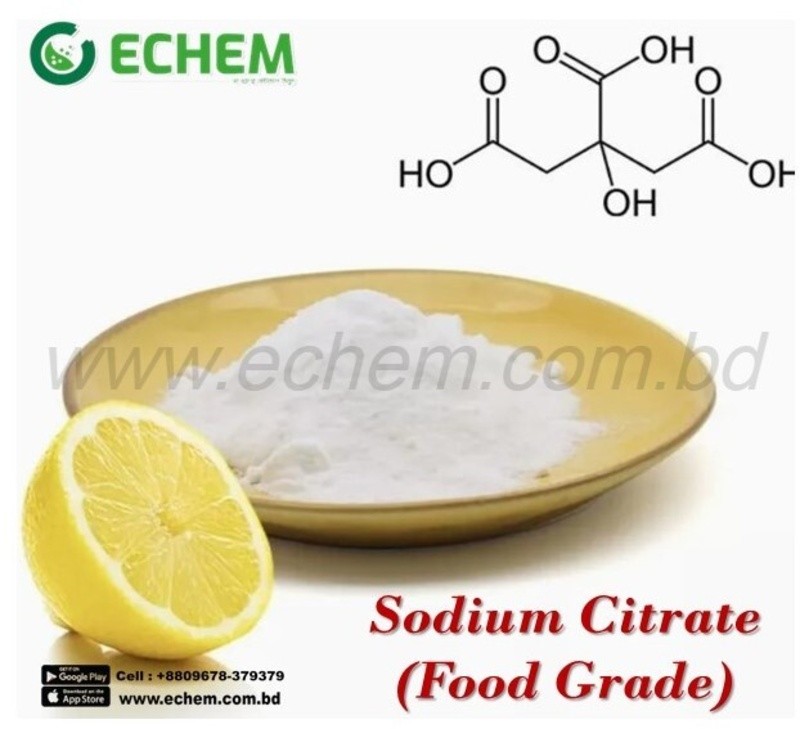Sodium Citrate (Food Grade)
Sodium Citrate (Food Grade) is a sodium salt of
citric acid, often found as a white, crystalline powder with a mildly salty and
slightly tart taste. It’s known for its versatility as an additive in the food
industry, where it serves a range of functions from flavor enhancement to pH control.
- Appearance:
White, crystalline powder or granules.
- Taste:
Mildly salty and tangy.
- Solubility:
Highly soluble in water, making it easy to incorporate into various food
and beverage products.
- Chemical
Formula: Na₃C₆H₅O₇
- Safety:
Generally recognized as safe (GRAS) by the FDA when used in moderate
quantities.
Uses of Sodium Citrate (Food Grade)
- Acidity
Regulator and Buffering Agent
- pH
Control: Sodium citrate is commonly used to control and stabilize the
pH of food products, especially in beverages, dairy, and processed foods.
- Improves
Shelf Life: By maintaining a stable pH, sodium citrate helps prevent
spoilage and extend the shelf life of foods.
- Flavor
Enhancer and Modifier
- Tangy
Flavor: It’s used to provide a mild tartness and balance acidity,
especially in fruit-flavored beverages, candies, and carbonated drinks.
- Salt
Replacement: Sodium citrate can impart a salty taste without
increasing sodium chloride levels, making it useful in low-sodium
formulations.
- Emulsifier
and Stabilizer
- Cheese
and Dairy Processing: Sodium citrate helps emulsify cheese, improving
its meltability and preventing oil separation. It’s essential in
processed cheeses, making them smoother and more cohesive.
- Ice
Cream and Dairy Desserts: Helps prevent the formation of ice crystals
in frozen desserts, leading to a smoother texture.
- Preservative
- Preventing
Spoilage: Its antimicrobial properties help inhibit the growth of
bacteria and mold, making it a useful preservative in perishable food products.
- Improving
Freshness: Sodium citrate helps maintain the freshness of meats,
poultry, and seafood by slowing spoilage.
- Anticoagulant
in Medical and Food Applications
- Blood
Preservation: In some cases, sodium citrate is used as an
anticoagulant in blood collection for food-related safety testing and
analysis.
- Preventing
Protein Aggregation: It prevents protein precipitation, which is
useful in foods and beverages containing proteins, such as milk-based
drinks and supplements.
- pH
Modifier in Baking and Confectionery
- Improving
Dough Quality: In baked goods, sodium citrate can help control the
acidity of the dough, impacting texture and leavening.
- Enhanced
Shelf Stability: Stabilizes confections like candies, enhancing their
stability in terms of flavor and texture.
How to Use Sodium Citrate (Food Grade)
- Cooking
and Baking: Dissolve in water before adding to dishes to create smooth
sauces, like cheese sauces, or to stabilize the texture of baked goods.
- Beverages:
Add a small amount to drinks for a balanced tangy taste.
- Emulsifying
Cheese: For making melted cheese sauces, dissolve sodium citrate in
water, heat, and then add cheese for a smooth, homogeneous mixture.
If you'd like to know more about this chemical or need any analysis report regarding this chemical then contact us: support@echem.com.bd.
Sodium Citrate (Food Grade)
- Helps balance pH levels and acts as a pH buffer
- Can act as a preservative
- White powder
- Purity: 99.9%
- Heavy metal tested and conforms
- GMO-free
- Biodegradable, safe for the environment
Shelf life: 36 months

Login To Comment